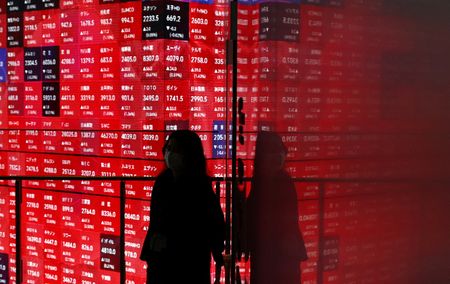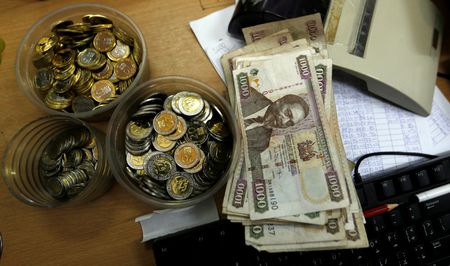By Amanda Cooper and Gertrude Chavez-Dreyfuss
LONDON/NEW YORK (Reuters) -The U.S. dollar traded mixed overall on Monday, falling against the yen and sterling, but posting gains versus the Swiss franc, as investors waited warily for further news of U.S. trade policy and braced for a week packed with economic data.
This week’s economic reports may give a first glimpse of whether U.S. President Donald Trump’s trade war is hitting home.
“This is the calm before the storm. We’re consolidating, trading broadly sideways today mostly within Friday’s ranges,” said Marc Chandler, chief market strategist, at Bannockburn Global Forex in New York.
“The big stuff still lies ahead this week. We have largely seen soft survey data, but this week we will see evidence that weakness has crept into the real sector data such as Q1 GDP (gross domestic product) and that’s before the tariffs.”
For now, the dollar has found its footing, trading little changed against the euro at $1.1365 and rising 0.2% versus the Swiss franc to 0.8280 franc.
It was down 0.5% versus the yen at 142.99 yen, headed for its largest monthly fall in nearly 2-1/2 years as Trump has rattled confidence in the dependability of U.S. assets.
The euro, on the other hand, was on track for its largest monthly gain against the dollar since November 2022. The greenback did trim monthly losses against both the euro and yen toward the end of last week amid an apparent conciliatory shift in the tone of U.S.-China relations.
Both sides seemed to soften their respective stances, with the Trump administration signalling openness to reducing tariffs and China exempting some imports from its 125% levies.
Yet where Trump insists there has been progress, and that he has spoken with President Xi Jinping, Beijing has denied trade talks are occurring and on Sunday, Treasury Secretary Scott Bessent did not say that tariff talks were under way.
On Monday, Bessent said top U.S. trading partners had made “very good” proposals to avert U.S. tariffs, and one of the first deals to be signed would likely be with India.
As for China, the top Treasury official said “all aspects of government are in contact with China,” and underscored that it was up to China to reduce tensions since it sold five times more goods to the United States than vice versa.
BIG DATA COMING UP
Investors are also awaiting the April U.S. jobs report, due on Friday, where jobs growth is still expected, although at a sharply slower pace than a month earlier.
Federal Reserve officials including Chair Jerome Powell have indicated they would be willing to cut interest rates if it becomes clear there are risks to growth. But most appear content to first determine what impact Trump’s tariffs have on real-economy metrics such as inflation and employment before making a move.
“So unless the hard data — particularly jobs and consumption — clearly rolls over, the Fed is unlikely to act before July. They need real deterioration to justify a move, not just forecasts or soft indicators,” Saxo Bank chief investment strategist Charu Chanana said.
The U.S. also releases first-quarter GDP data and the Federal Reserve’s favored inflation gauge, core PCE, this week, while GDP and preliminary inflation figures are also due in Europe.
Across the Atlantic, the euro fell 0.4% against the pound to 84.97 pence, as news hit of a massive power outage across much of Spain on Monday.
Canadians, meanwhile, vote in a general election on Monday, with the ruling Liberal Party holding a narrow lead in opinion polls and a larger one in online prediction markets. Options markets suggest traders are not bracing for much volatility in currency trade and the Canadian dollar was flat at C$1.3854 per U.S. dollar.
The Bank of Japan, on the other hand, sets monetary policy on Thursday.
No policy change is expected, though markets will be focused on the outlook and how policymakers are planning to navigate an uncertain economic environment- especially as U.S.-Japan trade talks are expected to touch on the currency.
Japan’s top currency diplomat Atsushi Mimura on Monday denied a report in the Yomiuri newspaper that Bessent had said during a bilateral meeting with Japan that a weak dollar and a strong yen are desirable.
Currency
bid
prices at
28 April
02:27
p.m. GMT
Descripti RIC Last U.S. Pct YTD Pct High Low
on Close Change Bid Bid
Previous
Session
Dollar 99.37 99.729 -0.35% -8.41% 99.837 99.3
index 75
Euro/Doll 1.1372 1.1362 0.09% 9.84% $1.1381 $1.1
ar 329
Dollar/Ye 142.93 143.65 -0.45% -9.12% 143.895 143
n
Euro/Yen 162.56 163.25 -0.42% -0.4% 163.33 162.
52
Dollar/Sw 0.8275 0.8266 0.11% -8.82% 0.8317 0.82
iss 69
Sterling/ 1.3384 1.3311 0.55% 7.01% $1.3385 $1.3
Dollar 281
Dollar/Ca 1.3843 1.3851 -0.05% -3.73% 1.3893 1.38
nadian 43
Aussie/Do 0.6416 0.6397 0.33% 3.72% $0.6418 $0.6
llar 369
Euro/Swis 0.941 0.9402 0.09% 0.18% 0.9437 0.93
s 98
Euro/Ster 0.8494 0.8537 -0.5% 2.67% 0.8544 0.84
ling 96
NZ 0.5966 0.5963 0.06% 6.63% $0.597 0.59
Dollar/Do 29
llar
Dollar/No 10.3762 10.4196 -0.42% -8.71% 10.4628 10.3
rway 794
Euro/Norw 11.8015 11.8498 -0.41% 0.28% 11.8807 11.8
ay
Dollar/Sw 9.6253 9.6627 -0.39% -12.63% 9.7335 9.62
eden 8
Euro/Swed 10.9529 10.9918 -0.34% -4.48% 11.0491 10.9
en 439
(Reporting by Amanda Cooper in London and Gertrude Chavez-Dreyfuss in New York; Additional reporting by Tom Westbrook in Singapore; Editing by Shri Navaratnam, Gareth Jones and Emelia Sithole-Matarise)










